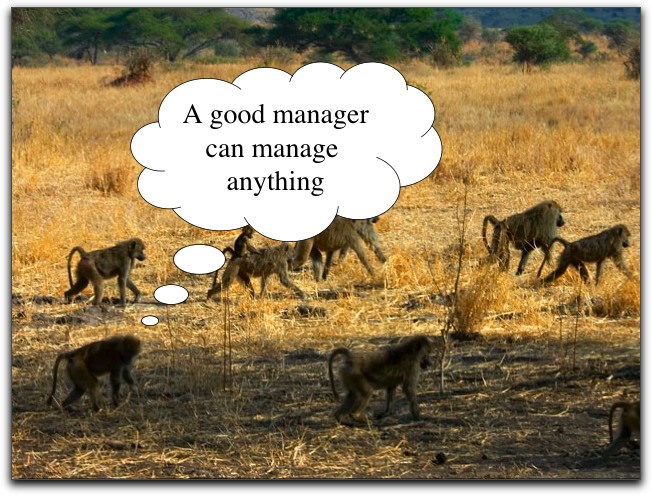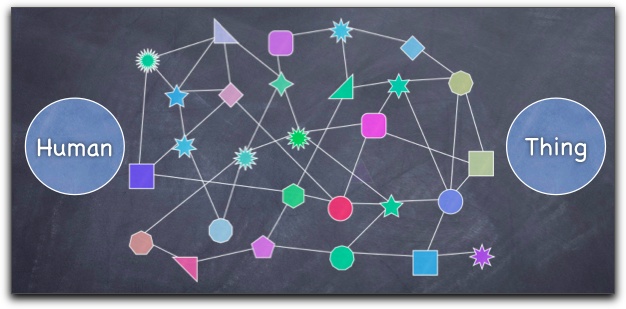Latour 5: Disliking the divide
A transcript of an OOPSLA talk: Table of contents
A post by Clarke Ching finally nudged me to finish this Latour series. Here’s the key excerpt:
The bad news is that I think we are about to fuck it all up because (according to my jaded view of the world) we - the agile community - are focusing on the wrong things. We are focusing on optimising our technical skills (the bits we are naturally good at), but we are ignoring the skills we really need to foster within our community. What are these skills? I’d like to call them marketing and sales skills, but I think they’ll be better received if I call them “influencing” skills.
I’d like to disagree in the sense that I think things are even worse. Latour shows how.
Here are two statements that drive me crazy:
A good manager can manage anything.
The net treats censorship as damage and routes around it.
Neither of them is true. Start with the first. Remember the baboons?

That baboon manager is ignoring how important things are for organizing and maintaining social structure. Someone who thinks a good manager can manage anything thinks that individual relationships are everything; things are nothing. Oddly, those people are often extremely good at individual relationships.
The net enthusiast is making the opposite mistake: things are everything; the social is nothing. She’s assigning one specific technology (packet switching) greater power than a complex social structure acting to prevent people from seeing information or, if they do see it, encouraging them to dismiss it. (It’s a mistake to think of censorship as an isolated act.) She’d find the subtle process by which Pasteur “converted” Anthrax from a disease to a bacillus uninteresting: since Anthrax is caused by a bacillus, Pasteur’s social network (comprised of thousands of people who had very specific effects) was inevitable.
I claim that, especially in the early days of Agile, there was a semi-conscious ANT-esque mixture between things and people and social structure and networks of influence.

Consider JUnit and the early practice of test-driven design. It encouraged pair programming because it’s harder to cheat and not write tests when you and your pair have to agree. (Pairing turns a private vice into a social event.) JUnit and pair programming both encouraged and enabled collective code ownership. “Encouraged” because collective code ownership reveals missing tests; “enabled” because tests make it safer to change someone else’s code. JUnit, TDD, pairing, and collective code ownership encouraged the development of continuous integration, which is itself an amalgam of tools, techniques, and social structures (such as those created at conferences).
JUnit, with its associated things and technical actions, helps build the team as a social unit. Early Agile, especially XP, had a bias toward building a network to bind the social and technical together.
To a large extent, I think that’s been lost. Clarke correctly points to technologists retreating to the safety of the most purely technical practices. (Kent Beck made the same point when he responded to Glenn Vanderburg’s OOPSLA talk on the relationship among XP practices.)
However, there’s been an equal and opposite retreat on the part of the humanists. People who talk about team-building are extremely unlikely to talk about JUnit’s role. Instead, team building is (if you’re a Scrum Master) about tactics like keeping your mouth shut and forcing people to self-organize. If you’re a regular attendee of AYE, it’s more likely to be about helping people to become congruent, using Satir-derived techniques that model teams as dysfunctional families.
No actual things with a pedigree more recent than the talking stick need apply.
Both retreats are alarming. Because of my personality, I’m more alarmed by the renewed ascendency of humanism and managerialism than Clarke is. I point to the website of the Agile Project Leadership Network:

This is absolutely standard leadership iconography: the hero, alone, struggling in a forbidding or at least exceptional environment. Anyone who thinks such iconography doesn’t matter probably also thinks that advertising doesn’t affect her and that she really reacts to $99.99 as being one cent less than $100.00. I think it works to maintain the status quo by reinforcing the self-image of the people who need to change as much as team members do.
I think we need to get back to our roots and try to recapture some of the strangeness of Agile. Think about it. Pair programming? What a stupidly inefficient idea! Bullpens? How could anyone think? Insisting on delivering something in a month? We can’t even order the servers in that time! Deliberately deciding to be reactive instead of proactive? But haven’t we spent our lives being told being proactive is better?
All that stuff was crazy. We need another generation of crazed thinkers constructing new actor-networks, new mixtures of the social and the technical.


December 9th, 2007 at 12:05 pm
[…] The divide: Early Agile, especially XP, had an ANTian delight in the interplay between the social and tools. That’s being lost. Someone should do something about it. […]
December 11th, 2007 at 11:09 am
I think that once a _movement_ is labelled a “movement”, this sort of phenomenon is bound to arise. People who practice only technology or only management/methodology disciplines within the “movement” are unlikely to accept the perspectives of the folks (call them “balancers”) who try to balance both; primarily because the balancers are not as accomplished as either group in a given emphasis. Kenneth Burke and many others in the field of critical rhetoric describe this theory when describing “the rhetoric of ascent.” I recommend Wayne Booth’s “Modern Dogma and the Rhetoric of Ascent” for those interested. Anyway, the theory (basically) assert’s that in technical/specialized fjelds, people’s opinions are accepted (or not) based on the individual’s adeptness of working within that “movement.”
Working with ease is of little consolation when you have to spend countless non-working hours studying the latest theories, buzzwords, technologies, movements, etc. just to participate in the network of the “movement.”
December 13th, 2007 at 1:31 pm
I’ve ordered “Modern Dogma”. As a side note, I’ve long noticed that, for many, the need to find and attack zealots is itself a form of zealotry. There’s a Rashomon problem going on: people of good will and good sense see Agile quite differently than I do. My instinct is just to go my own way and not argue; or, if I must argue, to argue on grounds of specific observations and experience - which is missing the underlying dynamic (my own as well as my interlocutor’s). Perhaps Booth can help.